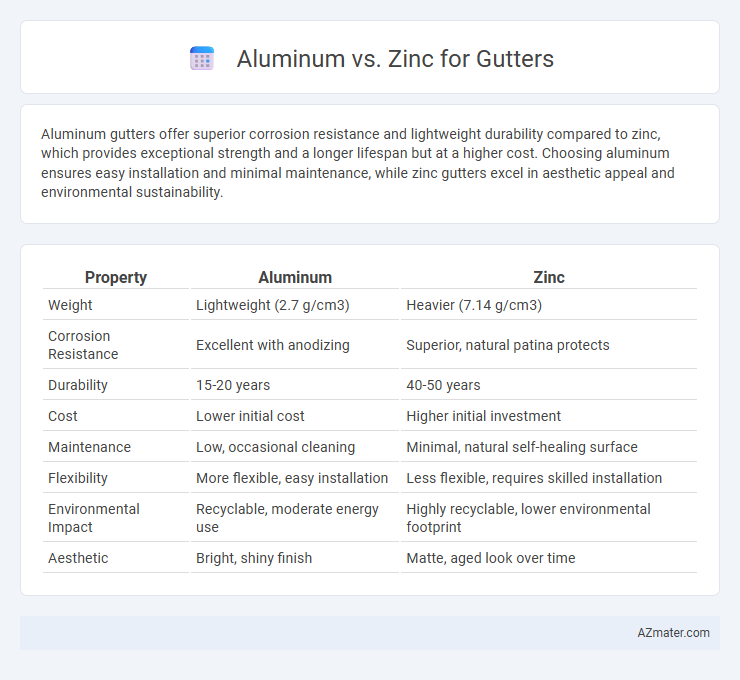Aluminum gutters offer superior corrosion resistance and lightweight durability compared to zinc, which provides exceptional strength and a longer lifespan but at a higher cost. Choosing aluminum ensures easy installation and minimal maintenance, while zinc gutters excel in aesthetic appeal and environmental sustainability.
Table of Comparison
| Property | Aluminum | Zinc |
|---|---|---|
| Weight | Lightweight (2.7 g/cm3) | Heavier (7.14 g/cm3) |
| Corrosion Resistance | Excellent with anodizing | Superior, natural patina protects |
| Durability | 15-20 years | 40-50 years |
| Cost | Lower initial cost | Higher initial investment |
| Maintenance | Low, occasional cleaning | Minimal, natural self-healing surface |
| Flexibility | More flexible, easy installation | Less flexible, requires skilled installation |
| Environmental Impact | Recyclable, moderate energy use | Highly recyclable, lower environmental footprint |
| Aesthetic | Bright, shiny finish | Matte, aged look over time |
Introduction to Aluminum and Zinc Gutters
Aluminum gutters are lightweight, corrosion-resistant, and offer excellent durability, making them a popular choice for residential roofing systems. Zinc gutters provide exceptional longevity and develop a protective patina over time, which enhances their resistance to weathering and reduces maintenance needs. Both materials serve distinct advantages in gutter applications, with aluminum favoring cost-effectiveness and ease of installation, while zinc is valued for its premium durability and aesthetic appeal.
Material Composition and Properties
Aluminum gutters are composed primarily of lightweight aluminum alloy, which offers excellent corrosion resistance and flexibility, making them less prone to denting and easy to install. Zinc gutters consist mainly of zinc metal with small amounts of copper and titanium, providing exceptional durability, natural corrosion resistance, and the ability to develop a protective patina over time. Aluminum's lower density makes it more cost-effective, while zinc's self-healing surface and longer lifespan make it ideal for premium gutter systems.
Durability and Longevity Comparison
Aluminum gutters resist rust and corrosion, offering excellent durability in both dry and wet climates, and generally last 20 to 30 years with proper maintenance. Zinc gutters are highly durable, with a natural patina that protects against corrosion, often providing a lifespan of 50 years or more, making them a premium choice for longevity. The choice between aluminum and zinc gutters should consider climate exposure and desired lifespan, as zinc offers superior long-term durability but at a higher initial cost.
Resistance to Corrosion and Weather
Aluminum gutters offer superior resistance to corrosion due to their natural oxide layer, making them highly durable in wet and humid climates. Zinc gutters provide excellent weather resistance through self-healing properties of their surface patina, which protects against rust and environmental damage over time. Both materials withstand harsh weather conditions effectively, but aluminum's lightweight and cost-efficiency often give it an edge in corrosion-prone environments.
Weight and Ease of Installation
Aluminum gutters are significantly lighter than zinc, weighing approximately 1.1 pounds per linear foot compared to zinc's denser 3.2 pounds per linear foot, making aluminum easier to handle and install. The lower weight of aluminum reduces installation time and labor costs, as fewer supports are needed, simplifying the mounting process on a variety of roof structures. Zinc gutters, while durable, require more specialized tools and skills to install properly due to their weight and rigidity, increasing complexity and installation duration.
Aesthetic Appeal and Finish Options
Aluminum gutters offer a versatile range of finish options, including smooth, textured, and baked-on enamel coatings that resist fading and provide a clean, modern aesthetic. Zinc gutters develop a natural patina over time, giving them a distinctive, rustic appearance that enhances historic or traditional architectural styles without requiring additional painting. The choice between aluminum and zinc ultimately hinges on desired aesthetic longevity and maintenance preferences, with aluminum favoring vibrant color retention and zinc offering timeless, evolving beauty.
Cost Differences: Aluminum vs Zinc
Aluminum gutters typically cost between $4 to $6 per linear foot, making them more affordable than zinc, which ranges from $7 to $10 per linear foot due to its higher material and fabrication expenses. Zinc gutters offer superior durability and a longer lifespan, potentially reducing maintenance costs over time despite the initial higher investment. Homeowners balancing upfront cost with long-term value often choose aluminum for budget-friendly options or zinc for premium, lasting performance.
Environmental Impact and Sustainability
Aluminum gutters offer high sustainability due to their recyclability and lower energy consumption during production, making them an eco-friendly choice. Zinc gutters have a longer lifespan and naturally develop a protective patina, reducing the need for replacements and minimizing environmental waste. Both metals contribute to sustainable building practices, but aluminum's lightweight nature and extensive recycling infrastructure give it a slight advantage in reducing carbon footprint.
Maintenance Requirements and Tips
Aluminum gutters require minimal maintenance due to their resistance to rust and corrosion, making them ideal for regions with high humidity or frequent rainfall. Zinc gutters develop a protective patina over time, which reduces the need for painting but may require occasional cleaning to prevent debris buildup and ensure proper water flow. Regular inspection and removal of leaves or dirt from both aluminum and zinc gutters can prolong their lifespan and maintain optimal drainage efficiency.
Which Gutter Material is Best for Your Home?
Aluminum gutters offer lightweight durability, rust resistance, and easy maintenance, making them ideal for homeowners seeking long-lasting performance in various climates. Zinc gutters provide exceptional corrosion resistance and a natural patina that enhances curb appeal, often preferred for historic or high-end homes. Choosing the best gutter material depends on your budget, aesthetic preferences, and local weather conditions, with aluminum being cost-effective and zinc offering premium longevity and style.

Infographic: Aluminum vs Zinc for Gutter
 azmater.com
azmater.com